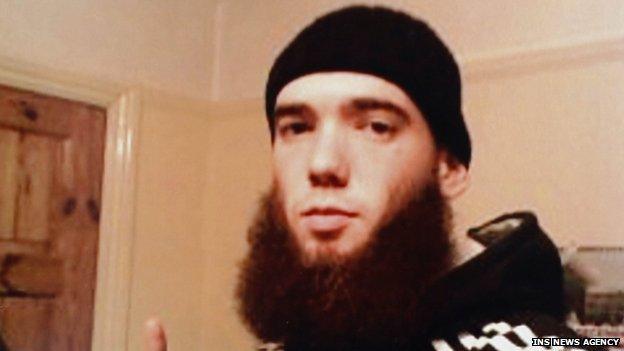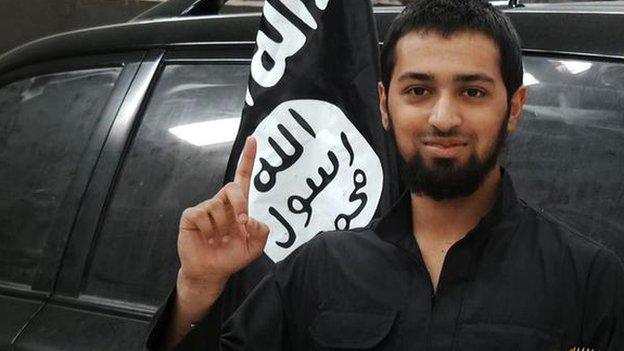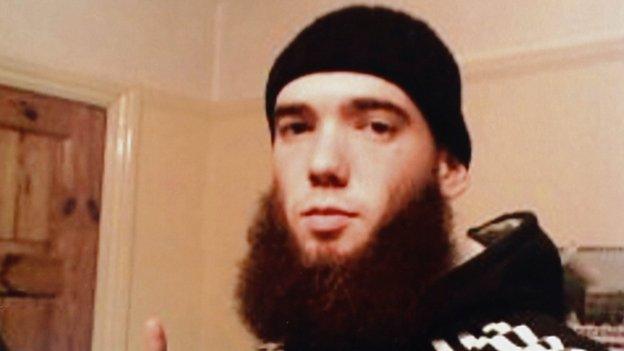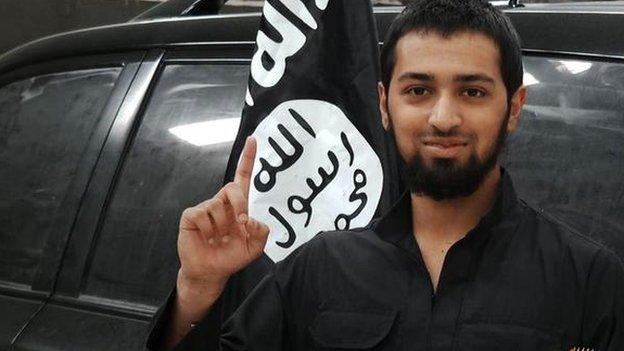IS recruits: Victims or criminals?
- Published

Thomas Evans changed his name to Abdul Hakim - and was killed fighting with al-Shabab
Just over 18 months ago, the UK's Crown Prosecution Service nailed its colours to the mast over Syria, making clear that fighting in Syria would almost certainly lead to the criminal dock back home.
The language and responses of police, politicians and prosecutors hardened. Arrests under terrorism legislation went up.
Fast forward to this week. Two Britons die for a common cause, thousands of miles apart.
Back home the respective families of Talha Asmal and Thomas Evans, who took the name Abdul Hakim, say the young men were ruthlessly groomed by jihadists: brainwashed into their deaths in Iraq and Kenya.
In their family's eyes, they were victims rather than criminals. Are they right?
Sally Evans said her son Thomas had converted to Islam as "he believed he would go to paradise"
Inside security circles, there has been a genuine debate about how to shape the message.
On the one hand, they want to put the fear of prosecution and jail into anyone flirting with the idea of going to the warzone.
On the other, they want to emphasise that their ultimate aim is to prevent tragedies, so they need people to work with them.
That phrase, "prevent tragedies", is the name of the official national website aimed at helping families just do that, external.
Is this a mixed message? And does it lead to the wrong tactics being deployed to make the individual think again?
Qari Asim is an Imam in Leeds who has been shocked by how IS has ruthlessly targeted young people, comparing them to predatory paedophiles. But he says that finding the line between "victim" and criminal is a difficult balance.
"They are victims to the extent that they have been brainwashed and manipulated. But taking life is where one crosses the line - and as a result we would call that a criminal act.
"That is a really key issue where we need to break that cycle and offer an answer. They are romanticising the act of terror … and creating this romantic utopian world that people should come and play their part."

Islamic State posted pictures on Twitter of Talha Asmal preparing for the suicide attack
Daniel Koehler is the director of a pioneering German scheme that has had some success with turning around neo-Nazis and jihadists.
He supports using the criminal law where needed - but warns that deradicalisation and counter-narratives won't work if government agencies treat the target simply as a criminal and don't offer them a way out.
The problem is, however, that the IS grooming of would be recruits is like a sales pitch to enlist young men by promising them guns, girls and gear.
"There are many things they are promised," he says, "a wage, up to four wives. They will be on the top of the society: the warrior class who will build that society and destroy the infidels. They get cars, they get homes, whatever they need - and they feel they are on top."
Those ideas run through a great deal of IS social media - but Koehler says that the grooming ultimately comes down to the simple political-theological idea: that someone can only be a true and perfect Muslim if they help to build the IS caliphate.

ISIS and the law
ISIS (also known as ISIL) is a banned organisation, external because there is proof that it uses violence in a way that passes the threshold to be banned under terrorism legislation
Membership of ISIS, support, or encouragement of its activities constitutes an offence
Police will therefore consider charging anyone they find who has shown support for ISIS
There is no single internationally agreed definition of terrorism, but the UK's interpretation, external includes acts of violence overseas, in relation to banned groups, against people who may have no connection at all to this country
In 2013, justices at the UK's Supreme Court unanimously backed that wide interpretation of terrorism

So can that be effectively challenged by locking people up?
We have no published statistics on how well the government's deradicalisation schemes do - although how exactly one measures success is perhaps a point of debate.
The police, for their part, will continue to pursue and charge anyone who breaks the law because that is what they are there for.
But they can't charge everyone of concern because building a criminal case is difficult. And it's at that point where the debate shifts out of criminality and into disruption and prevention.
In two weeks' time, public bodies, including schools and universities, will be under a controversial but groundbreaking new legal duty to prevent people being drawn towards terrorism.
They will have to be on the look-out for the warning signs. The measures are linked to broader legal duties of "safeguarding" the young from harm.
Qari Asim warns the government needs to leave "safe spaces" where vulnerable young people can talk frankly.
"We need to hear them out so that we know what they are thinking and show them the different side of the coin," he says.
"If you don't do that, you are leaving them at the mercy of those perpetrators."
- Published15 June 2015

- Published15 June 2015
